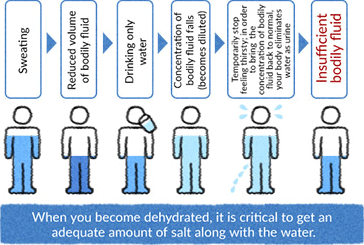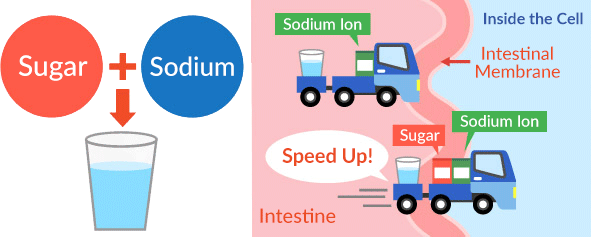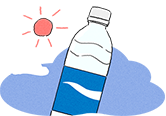Efficient rehydration
In general, a person loses approximately 2.5 liters of water per day (approximately 1.5 liters in urine, 900 milliliters through perspiration,* and 100 milliliters in stools). During the summer, everyone needs to remain aware of the need to replenish the water lost through sweating.
- *Water lost through breathing and the skin
When a person drinks a lot of water at once in order to replenish water that has been lost, this disrupts the electrolyte balance in the body and results in a suboptimal physical condition. As a rule, the amount of water drunk should match the amount of water lost, making sure to also replenish the salt (sodium) lost through sweating.
Water alone is not enough. The salt (sodium) lost through sweating also needs replacing

The blood circulating your body contains almost 0.9% sodium, and some of this is lost when you sweat, which is why your sweat tastes salty. If you sweat a lot (and thus lose sodium), and then drink only water, the concentration of sodium in your blood will become diluted, and you will stop wanting to drink water in order to prevent the sodium concentration from falling any further. You will also simultaneously eliminate excess water from your body as urine. This will result in you not being able to replenish the volume of bodily fluid you had before you started sweating. Your ability to exercise will decrease, your body temperature will increase, and you will develop heat disorders.
Rehydration including salt (sodium) and sugar is effective
The Japan Sport Association recommends beverages that contain sugar and 0.1% to 0.2% table salt (40mg to 80mg sodium per 100ml) for rehydration to prevent heat disorders. Particularly when exercising for 1 hour or longer, beverages containing 4% to 8% sugar should be drunk. Although it is easy to use chilled sports drinks or oral rehydration solutions, you can also make your own drink by dissolving half a teaspoon of table salt (2g) and several sugar cubes in a liter of water.
When continuing to exercise for a long time, it is necessary to increase the sodium concentration. When exercising for an extended period, such as in a triathlon, the concentration of sodium in the blood may fall, resulting in heat cramps.
Beverages containing sugar are recommended because the sugar encourages fluid absorption in the intestinal tract. The mechanism involved is as follows: Glucose, the main sugar, is co-transported with sodium in the intestinal tract. Water is then absorbed due to the osmotic gradient produced by the sugar and sodium.







